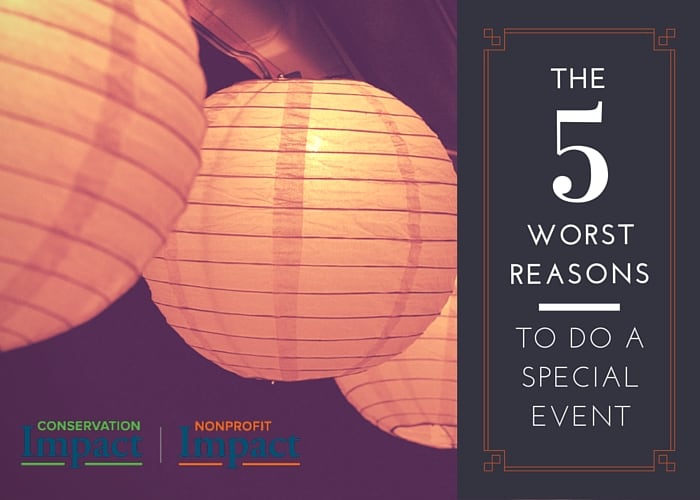
The 5 Worst Reasons to do a Special Event
A special event can do lots of great things for a mission-driven organization. It can bring in needed revenue, deepen connections with supporters, and garner attention from the community.
What’s not to love?
But the truth is that hosting a special event is also one of the most expensive ways to raise money. Special events put a strain on staff and volunteer capacity. As a leader, charged with being a good steward of your organization’s assets and capacity, you must ensure that you only take on events that offer sufficient return on investment and are truly strategic.
If any of the 5 worst reasons for holding a special event apply to your organization, it is time to rethink your special event strategy.
1. We are afraid to ask people for money
Why does it often seem easier to ask someone to buy a ticket to an event rather than to ask them to make a donation? One board member ventured that he preferred selling tickets because the person got something for their money.
Think about what’s behind that statement. It might be fear. Lots of us are afraid of asking for money. That’s why so many organizations seek fundraising trainings! If everyone is afraid of making an ask, it’s time to recruit some people who like doing that (they do exist).
But that answer also implies something much more concerning: a donor doesn’t receive anything of value when they give the organization an outright gift. That’s simply not true! Your donors get satisfaction, they get the benefit of living in a healthier community or enjoying the views you conserve (or whatever goodness your organization creates), and they get to feel a part of making that difference in the world. That kind of value is significantly greater than attending any event—but it might be less tangible or more difficult to articulate effectively.
Don’t discount the value of your organization’s work. It is absolutely worthy of investment. And if anyone in the organization really believes that the only value your organization has to offer someone is a fun evening, then you have larger issues.
2. We’ve always done it
I remember visiting my dad at work when I was about 10 years old. That’s the first time I noticed a note written at the top of the whiteboard in his office: “Just because we’ve always done it” is never an acceptable answer. Preach!
No matter how strategic or successful your events have been in the past, the future is never guaranteed. All events have a life cycle and audiences can be fickle. As a long-time supporter of a local land trust preparing for its 12th environmental art auction said, “How many landscapes do they think we are going to buy?”
3. Another organization was very successful hosting an event like this
When you are a staff person, it is so hard to bite your tongue and not answer this comment with, “So what?” But honestly, that’s the answer it deserves.
Special events are very situation specific—competition, audience interest, and organizational capacity to execute an event all vary from community to community and from organization to organization. Never assume that what worked for the other guy will work for you. And unless you have access to their financials, you don’t really know how well it went, do you?
4. A member of our board (or staff) really likes it
No. Just, no. If you are incorporated as a 501(c)(3), then you have a mission. Unless that mission is “Throw a gala because the Board Chair really likes them,” then what are you doing? Channel your inner Nancy Reagan and just say no. Unless the event is truly strategic for your organization, it doesn’t matter who likes it.
5. We don’t know how to say no
Did that last paragraph make you queasy? Sorry about that. But that’s what leadership feels like sometimes. If any of these traps have your organization stuck with an event just isn’t worth the effort, then the crux of the issue is an inability to say no.
Again, your mission isn’t to make people happy; it is to make an impact. And your job is to be the best steward of your organization and its assets in support of that mission as you can possibly be. Let that sense of duty stiffen your spine a bit and practice saying no.
(image credit: peabody111)

